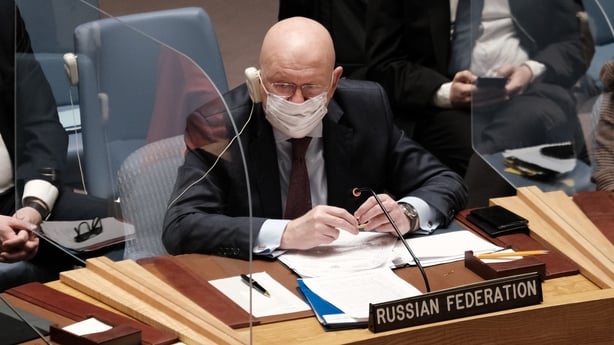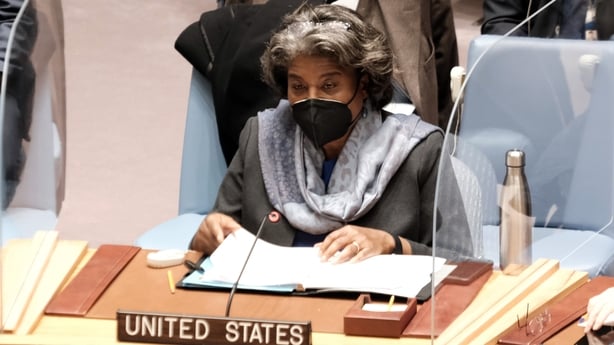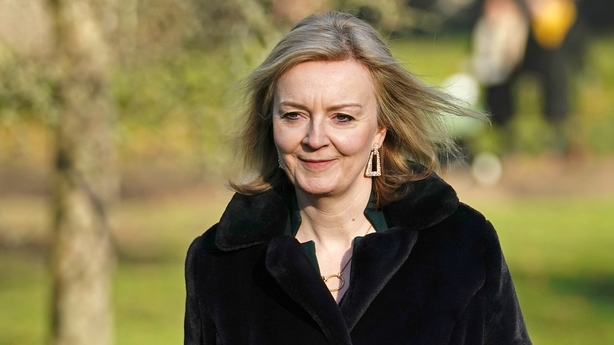Russia and the United States faced off at the UN Security Council over Moscow's troop buildup on the Ukrainian border, as Western nations intensified their high-stakes diplomatic push to avert open conflict in Europe.
With tensions soaring, the US has declared itself ready to push back against any "disinformation" Moscow puts forward in one of the most closely watched United Nations sessions in years.
The US-requested meeting, which began this afternoon, came with fears growing of an imminent incursion into Ukraine, despite Kremlin denials.
Russia tried to block the 15-member council from holding the meeting at all - with its envoy to the UN Vasily Nebenzya accusing the United States of trying to "whip up hysteria" by pushing a Security Council debate.

But Washington's UN envoy Linda Thomas-Greenfield said Moscow's troop buildup justified the move, and Russia's blocking move was rejected with ten out of 15 members backing Washington.
"This is the largest... mobilization of troops in Europe in decades," the ambassador said. "And as we speak, Russia is sending even more forces and arms to join them."
We need your consent to load this rte-player contentWe use rte-player to manage extra content that can set cookies on your device and collect data about your activity. Please review their details and accept them to load the content.Manage Preferences
She told the council Russia's military buildup had been paired with "aggressive rhetoric" as part of an escalation often seen from Russia when it seized Crimea in 2014.
And she accused Russia of planning to build its military force in Belarus to 30,000 within weeks as a part of its threat to Ukraine.

Russia has sent 5,000 troops into Belarus "with plans for more in coming weeks," the White House has said.
"We feel its important to be open and candid about the threat from Russia," White House spokeswoman Jen Psaki told reporters at a news briefing, pointing to thousands of other Russian troops near the Russia-Ukraine border.
"It's dangerous," she added. "We have been saying for more than a week that Russia could invade anytime."
Ireland's ambassador to the United Nations has drawn a parallel with the foundation of the Irish State and Ukraine's right to decide its own future.
Ambassador Geraldine Byrne Nason told the UN Security Council that Ireland had just marked 100 years since the State’s "hard won independence".
She told a debate on the Russian troop build up that just as Ireland would not accept another state determining Ireland’s foreign and security policy, Ukraine similarly had the sovereign right to choose its own policies.
The United States and its allies have ramped up joint efforts to deter any invasion of Ukraine, with Washington and London yesterday warning such a move would be punished with new and "devastating" economic sanctions.
Today, US President Joe Biden said that the United States is pursuing diplomacy to resolve the crisis brewing around Ukraine but warned Russia that "we are ready no matter what happens".
"Today in the United Nations, we laid out the full nature of Russia's threat to Ukraine's sovereignty and territorial integrity of Ukraine, as well as (to the) core tenets of the rule-based international order," Mr Biden said in the Oval Office.
"We continue to urge diplomacy as the best way forward, but with Russia continuing its build-up of its forces around Ukraine, we are ready no matter what happens."

The UK is to tighten its legislation in order to impose tougher sanctions on Russia, foreign minister Liz Truss has told parliament.
"This will be the toughest sanctions regime against Russia we've ever had," Ms Truss told MPs, saying "those in and around the Kremlin will have nowhere to hide".
The British minister said that legislation allowing the government to target a broader range of individuals and businesses will be in place by 10 February.
The move will broaden current legislation, which only allows the UK to target Russians specifically "linked to the destabilisation of Ukraine", Ms Truss said.
The legislation would allow the UK to take part in an "unprecedented package of coordinated sanctions with our partners" including the United States, the minister said.
The UK is also reviewing investor visas already issued to Russians, Ms Truss added.
The Kremlin denounced Britain's move as an "undisguised attack on business," charging: "The Anglo-Saxons are massively ramping up tensions on the European continent."
Analysts say an array of sanctions hitting Russian banks and financial institutions would not only affect daily life throughout Russia but could roil major economies in Europe and elsewhere.
As they work to defuse the crisis, Western leaders have also stepped up military assistance to Ukraine.
Britain's Prime Minister Boris Johnson, due to speak with Mr Putin this week, announced London is preparing to offer NATO a "major" deployment of troops, weapons, warships and jets.
NATO Secretary-General Jens Stoltenberg yesterday welcomed the increased military support while also endorsing London's diplomatic initiative.
Read more:
Weakest link? Germany, Ukraine and the Russian threat
What Russian invasion of Ukraine may mean for Irish economy
Is Russia prepared for full-scale invasion of Ukraine?
The plunge in relations between Moscow and the West - at their lowest point since the Cold War - has sparked fears in Europe of losing crucial access to Russian gas supplies in the event of a Ukraine invasion, spurring a hunt for contingency plans.
Russia has repeatedly denied posing a threat to Ukraine and said yesterday that it wanted "respectful" relations with the United States.
Citing NATO's presence near its border, Moscow has put forward security demands to Washington and the US-led military alliance.
They include a guarantee that NATO will not admit new members, in particular Ukraine, and that the United States will not establish new military bases in ex-Soviet countries.
Ukraine has turned increasingly to the West since Moscow seized the Crimea peninsula in 2014 and began fueling a separatist conflict in the east of the former Soviet republic that has claimed over 13,000 lives.
But in the face of the troop buildup, Ukrainian President Volodymyr Zelensky has called on the West to avoid stirring "panic".
Additional reporting Tony Connelly
